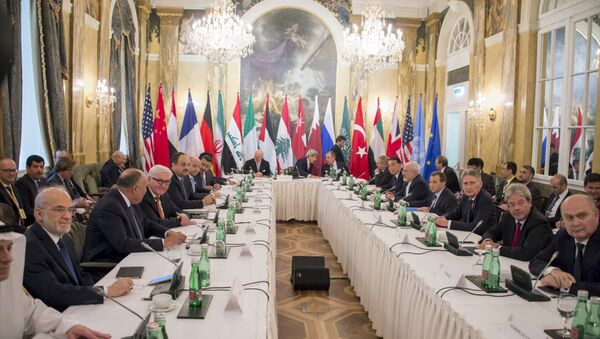MOSCOW (Sputnik) – On Thursday, the top diplomats from the United States, Russia, Saudi Arabia, and Turkey convened in the Austrian capital for the first round of talks.
They were joined by officials from China, Egypt, the European Union, France, Germany, Iran, Iraq, Italy, Jordan, Lebanon, Oman, Qatar, United Arab Emirates, the United Kingdom and the United Nations on Friday.
EU foreign policy chief Federica Mogherini called the talks, where the sides agreed on a 9-point plan on Syrian settlement, "difficult but constructive."
The international negotiators would resume talks on Syria in two weeks, according to a provision included in the final communique.
United, Peaceful Syria
According to the communique, Syria’s "unity, independence, territorial integrity, and secular character are fundamental." State institutions in the country must remain intact, while the rights of all Syrians must be protected, irrespective of their ethnicity of religious beliefs.
The sides agreed to expedite diplomatic efforts and explore together with the United Nations the approach and the implementation of the ceasefire, "to be initiated on a date certain and in parallel with this renewed political process."
Russian Foreign Minister Sergei Lavrov said the ceasefire was only discussed in general terms, and no specific dates were set.
"Nobody has coordinated any conditions except for the one that [the ceasefire] will not apply to terrorist groups and the fight against these terrorist groups," Lavrov said at the meeting.
US State Secretary John Kerry said he believed that the chances for the diplomatic settlement of the conflict were higher than before.
The communique also envisions humanitarian access throughout the Syrian territory, as well as increased support for internally and externally displaced people.
Intra-Syrian Political Process
According to the communique, the representatives of the Syrian government and the opposition will meet under the UN auspices to discuss "credible, inclusive, non-sectarian governance," as well as fair elections and a new constitution. The United Nations will supervise the elections, in which all Syrians will be eligible to participate.
"This political process will be Syrian led and Syrian owned, and the Syrian people will decide the future of Syria," one of the provisions stipulates.
The sides were, however, unable to agree on the role of Syrian President Bashar Assad. Some of the participants were demanding he resign, while others believe that his fate must be decided by the people of Syria.
"There is no agreement between us [negotiators] on how to decide on Bashar Assad's future. Russia is convinced that the Syrian people themselves should address the issue in context of the political process," Lavrov told a news conference in Vienna.
The top Russian diplomat also pointed out that he did not see a united opposition delegation. According to Lavrov, UN Special Envoy for Syria Staffan de Mistura and his colleagues would be dealing with this issue.
De Mistura called on all countries that have influence over the sides to the Syrian conflict to convince them to start dialogue.
Eraducation of Terrorists
The 9-point plan envisages defeating all terrorist groups as designated by the UN Security Council, including the Islamic State.
"We have agreed on, and this is reflected in the joint communique, to firmly and consistently fight against ISIL and other terrorist structures as recognized by the UN Security Council, as well as hold further consultations to agree on a list of other organizations, which are not yet included in the UN lists, but are clearly terrorist," Lavrov clarified.
Kerry stressed that the Islamic State and other groups could never be allowed to unite.
Military Participation of Moscow, Washington
"From the very beginning of our [air] campaign in Syria, which, I stress, is carried out at the request of the Syrian leadership, we have proposed the United States to negotiate on the coordination of our actions. So far, our US counterparts have only agreed to a mechanism to avoid unexpected incidents. But we are confident that we can do more, and more effectively fight against terrorists," Lavrov told reporters.
According to the minister, Moscow believes that the anti-terrorism fight must be based on international law.
"Russia insists that the fight against terrorism should be based on international law, which stipulates that military operations by air forces or land forces [must be carried out] with the approval of a related government and based on the decision of the UN Security Council," Lavrov stressed.
Russia has been conducting a military operation against the ISIL on Assad’s request, while the United States has decided to send over military advisors to help the so-called moderate opposition.
On Friday, US media reported the Obama administration will deploy up to 50 commandos to northern Syria. Two small US teams will assess the security situation on the ground and coordinate with local Syrian forces.
"We are investing in two parts approach, speaking for the United States, we are intensifying our counter-Daesh campaign and we are intensifying out diplomatic efforts in order to end the conflict," Kerry said.
Lavrov stressed that the decision to send US ground servicemen to Syria makes the issue of Moscow-Washington coordination even more urgent.
The probability of US and Russian forces coming into conflict in Syria amid the US advisors deployment to the country is low, White House Press Secretary Josh Earnest said on Friday.
Syria has been mired in a civil war since 2011. Syrian government forces are fighting against opposition factions and extremist groups.



